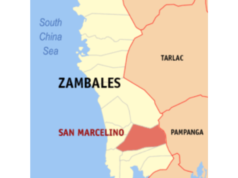SCIENCE CITY OF MUNOZ – A lady-entrepreneur here has found another in-demand product which is now also being exported to other countries: the “guyabano tea”.
Leticia Basubas of Barangay Maligaya, dubbed as the “Rice Coffee Queen of Nueva Ecija,” is processing and packaging into tea bags at least 1,000 kilograms of guyabano leaves every month. She earlier perfected the processing and production of rice coffee in tea bags and has been selling it through her various outlets in the country and abroad.
Of late, she added in her array of other products pure guyabano tea to satisfy customers’ demand for this product regarded as having medicinal properties.
“I am exporting P500,000 worth of pure guyabano tea and guyabano tea with pandan in the United States, Switzerland, Bulgaria, Iceland and Brunei every four to six months,” Basubas said. “I am looking forward to an increased demand abroad once my processing plant and office get halal certification and accreditation,” she added.
(Halal is any object or action which is permissible to use or engage in according to Islamic law. In the country, the body that provides certification and accreditation for food products is the Islamic Da’wah Council of the Philippines, Inc.).
Locally, her guyabano tea finds big market in big malls like SM and other super stores. “I buy the guyabano leaves from farmers we accredited as suppliers of these medicinal leaves,” Basubas said. “I pay them P20 per kilogram for the leaves they turn in,” she added.
The leaves, which she specifi ed from her suppliers to be not “too young” and “too old” and free from chemical spraying or attack by pests, are air-dried for three days and subjected to oven heating to free them from any microbe.
Guyabano (Anona Muricata Linn) is a tree commonly grown in the backyard in the country with its pearshaped fruits relished, when ripe, for its distinct sweet taste. The fruit, leaves and bark are described to contain medicinal properties.
Also known for its English name soursop and other names such as pawpaw, custard apple, and graviola, guanabana, among others, is native to Central and South America, and also found in sub-Saharan African countries, Mexico, Colombia, Brazil, Peru, and Venezuela, and in most Southeast Asian countries, including the Philippines.
Many quarters describe the guyabano as possessing medicinal properties that include cancer-fighting activity and many persons have been giving testimonies that they have been cured of their stage-four cancer condition.
Dr. Rafael R. Castillo, a physician who writes a weekly column for the Inquirer, wrote that no published clinical trials on human are yet available as to the efficacy of guyabano for cancer cure. He, however, noted that some studies done on guyabano by the Catholic University of South Korea and Purdue University in Indiana, United States, found that guyabano tree extracts had acted in a way that prevented it from harming normal cells, while successfully targeting the dangerous ones, unlike chemotherapy, which destroys all cells that multiply.
“But, it has to be emphasized that all of these trials were conducted in the laboratory only using non-living models, or what is called as in vitro experiments,” Dr. Castillo noted. It appeared that testimonials by many persons who claim to have been cured of guyabano have become a big pitch for the drinking of guyabano herbal tea.
“Many people are visiting us here looking for our guyabano tea,” Basubas said. “It seemed that many people are finding relief for their ailment for drinking this kind of tea,” she added.
Basubas said she has 40 workers who are helping process and pack guyabano tea and some of her other herbal teas out of malunggay leaves, ginger, turmeric (yellow ginger), lemon grass, ampalaya (bitter gourd), squash and carrots.




